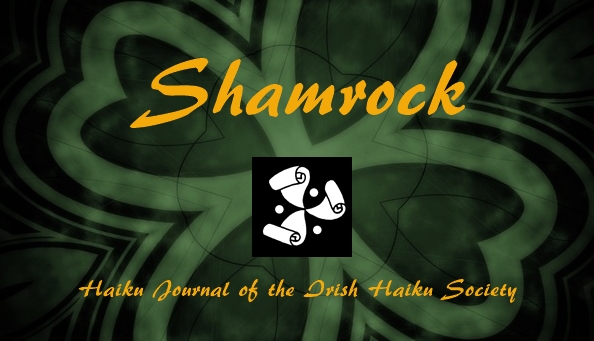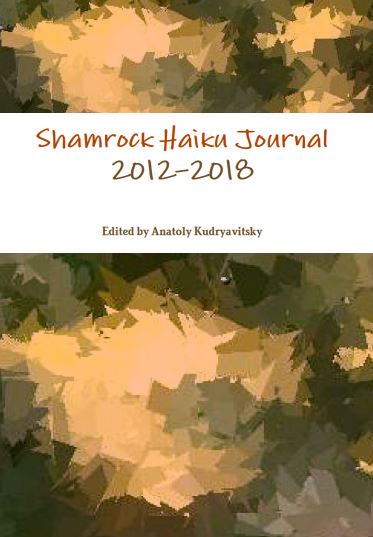the rest of the world
An international online journal that publishes quality haiku, senryu and haibun in English
irishhaikusociety[at]gmail[dot]com
(not for submissions)
Home Page
Archive
Book-Shop

We
are twelve years old! Founded in January 2007, Shamrock Haiku Journal
has
since been published regularly. On this occasion, we have prepared SHAMROCK
HAIKU JOURNAL: 2012 - 2018, a print edition of the twenty
issues of
Shamrock, Nos. 21 to 40, as they appeared on
the Shamrock website. This paper-based collection covers the full range
of English-language
haiku, from classical to experimental, as well as haibun. Also
included are English translations from one of the most prominent
Japanese haiku poets of the 20th century, Ryuta Iida, and an essay on
translating Matsuo Basho's haiku.
Shamrock
Haiku Journal: 2012 - 2018
Edited by Anatoly Kudryavitsky.
Copyright © 2012 - 2018 by Shamrock Haiku Journal.
All rights reserved.
Published
in Dublin, Ireland. Printed
in the United Kingdom. Price
Euro 16.92 Trade
paperback. 302 pp. Preview available here
IHS
International Haiku
Competition 2019 announced! The Irish Haiku Society International Haiku
Competition 2019 offers prizes of Euro 150, Euro 50 and Euro 30 for
unpublished haiku/senryu in English. In addition there will be up to
seven Highly Commended haiku/senryu. Shamrock
Haiku Journal
Readers' Choice Awards We invite all the readers of Shamrock
Haiku Journal to
vote for the best haiku/senryu poem published in 2019, i.e. in the
issues FORTY-ONE and FORTY-TWO (you cannot vote for your
own poem, though). To vote, send an
e-mail to irishhaikusociety[at]gmail.com with
"Best haiku of 2019" or "Best senryu of 2019" in the subject line.
Please insert the full text of the poem you vote for (only ONE poem in
each category) plus the name of its author in the body of your e-mail.
The deadline for vote is 29th February, 2020. The
best poems will be named in the next issue of Shamrock
Haiku Journal.
early
autumn
Sacred World
*
An Aboriginal mythological snake
A Row of Scarecrows by
Anatoly Kudryavitsky
ISBN 978-0-244-9767-9-8
5.8"x8.3", perfect binding.
Details and previous winners here:
https://irishhaiku.com/haikucompetition.htm
All the entries shall be postmarked / e-mailed by 30th November 2019.
Good luck to all!
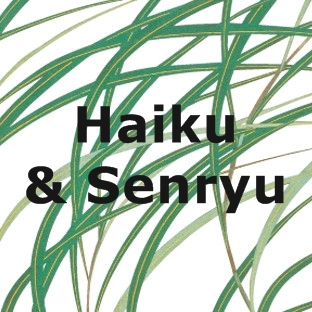
midday heat
puddles tighten
around tadpoles
cobblestone street
the patchwork
of old blossoms
locust song
apple-laden limbs
begin to sag
-- Bryan
Rickert (USA)
sunlight through gums
the mare and foal
stand head to tail
high country
snow daisies bloom
beside brumby bones
gusting change
a ladybird rides
an oak leaf
-- Gavin
Austin (Australia)
spring breeze
the deck chair collecting
maple seeds
between sun and shadow
blackberries bob
on the breeze
-- Ben
Moeller-Gaa (USA)
morning darkness
a braille of pigeons
dots a power line
snow moon
a doe sleeps
in a pine stand
--
Jennifer Hambrick (USA)
city snow
faces settle deep
into winter coats
star gazing
my thoughts travel
in an elliptical orbit
-- Jay
Friedenberg (USA)
lake twilight
embers of camp fire
still crackling
deep autumn
by the defunct railroad
stacked crossties
-- John
Zheng (USA)
calm shore
a pelican's arched wings
before the plunge
half moon
the osprey rotates
her reversible toe
-- Bill
Cooper (USA)
old drovers' trail
clints and grykes
whisper their secrets
unfinished toy boat
in a deep cistern
rain plops echo
-- Ian
Turner (England/France)
bitter wind –
faces in the street
turned inward
possum voices –
all night the cat door
opens, closes
-- Lorin
Ford (Australia)
littoral forest
deep in the heart
shearwaters moan
rain dancing
through a paddock
a rush of parrots
--
Marietta McGregor (Australia)
ghost apple
this emptiness
inside
city sirens
the wolves that used to
sing us home
-- Debbie
Strange (Canada)
silhouettes
in the twilight fog
a raven's call
a full moon
the old train tracks
into my childhood
--
Chen-ou Liu (Canada)
crow at dusk
crossing from this world
into another
-- Keith
Polette (USA)
orange sky
a wall of trees
holds back the evening
-- Perry
Powell (USA)
steady downpour
the long and short
of earthworms
-- Frank
Hooven (USA)
night journey –
white mist of snowmelt
rising from the road
-- Ruth
Holzer (USA)
late light
the rhythm
of a kayaker's silhouette
-- Hannah
Manohey (USA)
in the pasture
she looked almost asleep...
the dead new-born lamb
--
Michael Flanagan (USA)
on and off showers
collies running sheep
to a whistle's pitch
-- Tom Sacramona (USA)
pumpkin patch
best of the crop
with a bite out
-- Kate
Alsbury (USA)
less patient
than the heron
its reflection
-- Nola
Obee (Canada)
the trembling
of maple leaves
steady rain
-- Joanna
M. Weston (Canada)
humidity
even the squirrel
slowing down
--
Elizabeth Crocket (Canada)
between the debris
a sea of dead cattle
swallowed by floods
--
Barbara A. Taylor (Australia)
the stopped clock –
a dawn soft mist
ticking on fallen leaves
--
Adelaide B. Shaw (Australia)
the silence
of the hillside cistern –
snow all day
-- Sonam
Chhoki (Bhutan)
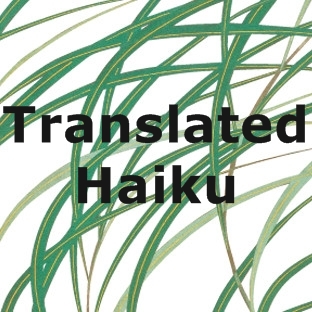
the swarming whispers
of vines
drizzle
dark-green leaves
of potato plants
autumn twilight
the moon comes down
from the hill
autumn downpour
the smell of crumbling resin
from the fir door
--
Antonietta Losito (Italy; translated from the Italian by Anatoly
Kudryavitsky)
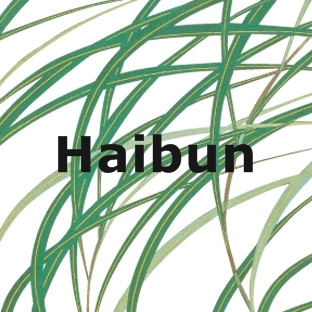
by
Anna Cates (USA)
Don't spend a lifetime in blindness. On parallel paths bells perfume
spring air with rhythm. Apocrypha blooms rhyme in aster-like asterisks.
Twined in the fingers of a serpent handler, the great snake Wollonqua*
quivers.
So embrace the everlasting. All truth is God's truth. The Djanggawul
Sisters birthed the Aborigines in Dreamtime**. To each his own
tjurunga*** beneath the revered rangga****.
gum leaf song
a taste of witchety grubs
and berries
** An Aboriginal myth
*** Sacred emblem
**** Ceremonial pole
Embroidering light
by Sonam
Chhoki (Bhutan)
The shower has petered out. Just beneath the taro leaves an early
spider is at work. Slowly it spins a taut mesh. A passing breeze stirs
the raindrops into beads of light. The spider pauses as each droplet
hits the web briefly illuminating the pattern of its weave.
late summer fading hue of slow evenings
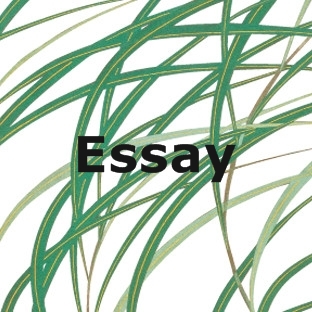
Haiku
about scarecrows are not as rare as one may think. On his website,
David G. Lanoue quotes the following haiku by Issa Kobayashi, probably
in his own translation: protecting the
camphor tree too... scarecrow
Michael
Dylan Welch, in two of his blog entries dated 28th June, 2016 and 8th June, 2017 gives examples of more recent
scarecrow haiku. Very similar ones. unscheduled
stop
homecoming –
a
scarecrow welcomes us
with open arms
(Anatoly Kudryavitsky; World Haiku Review, August 2012)
a
scarecrow's open arms
in
the fields
(Arvinder Kaur; Cattails, September 2014)
returning
home –
only the scarecrow
with open arms
(Shrikaanth K. Murthy; Shiki Online Kukai,
October 2015)
arriving on the farm –
the open arms
of
the scarecrow
(Kwaku Feni Adow; HIA website, December 2016)
On one of these web-pages, Mr. Welch
writes the following: "Is there plagiarism afoot here, even if
accidentally, or independent creation? I am happy to assume independent creation." And also, "Shrikaanth told me
he submitted his poem to the kukai a month before Arvinder sent him a
copy of her book, and that he believes he created his poem
independently (he said he hadn't seen the poem in Cattails, even though
he's now a proofreader for Cattails).
So perhaps Shrikaanth's and
Arvinder's poems are independently created, despite obvious
similarities, but what about the poem by
Kwaku Feni Adow? It's impossible to know from the poem itself, and
I doubt that much would be gained by asking the poet."
I leave it to the readers to decide if the string of scarecrow haiku
that appeared like mushrooms on a glade two years after I had published
my piece was, in Mr. Welch's terms, a case of "haiku similarity," or
something else. I know very well that ideas and images are great
travellers, so I would be the last person to think of using the word "plagiarism",
even jokingly.
And finally, shouldn't haiku poets make an emphasis on observing
nature, in its various manifestations, rather than on avid browsing
through the pages of haiku magazines? This may be a good remedy against
"permeating", reiterative images and other haiku sins.
